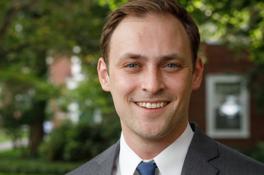
My name is John Conlon, and I graduated from Ohio State in 2016 with a bachelor of science in economics and philosophy as well as a minor in mathematics. I knew by the end of my freshman year that I wanted to pursue a PhD in economics. The honors undergraduate advisor at the time, Professor P.J. Healy, provided lots of helpful advice about how to prepare for a PhD program, including encouraging me to pursue a minor in mathematics and eventually hiring me to help manage the experimental economics lab. I also talked a lot with former Assistant Professor Karen Bernhardt-Walther (now at York University) and Professor Bruce Weinberg, who both provided tons of advice about research and how to succeed in economics generally.
Professor Healy also introduced me to former Assistant Professor Lucas Coffman (now at Boston College), whom I worked for as a research assistant from sophomore year until I graduated. After about a year of working with Professor Coffman, I began my senior thesis with him as my advisor. I was interested in how students choose which major to pursue in college, which I started thinking about after realizing that I myself had never even bothered to look up what people with different majors tend to earn after graduating before I decided to major in economics. That led me to wonder if students would make different choices if they were better informed about average salaries across majors.
To answer this question, I designed an experiment where I asked 700 Ohio State freshmen what they thought the average salaries were for students who graduated with various majors. I then gave half of them the right answers to these questions. Importantly, I received the students’ permission to access their transcripts going forward, so I was able to track how the major choices of students who got this information evolved over time, compared to the control group who did not receive any information. I ended up finding large effects, with an estimated 10% of students choosing a different major than they otherwise would have. Four and a half years (and many revisions) later, the paper got accepted at the Journal of Human Resources. By that time, I had spent two years as a research assistant at the Federal Reserve Bank of New York and had just completed my first year of classes as a PhD student at Harvard Business School.
My main research interests are behavioral economics and labor economics, often with a focus on education. For example, I worked with Professor Coffman and two other coauthors, Judd Kessler and Clayton Featherstone, on a project investigating whether credit constraints can prevent talented young college graduates from becoming teachers. We partnered with Teach for America and found that randomly offering some people an additional few hundred dollars of grant money or short-term loans dramatically increased the likelihood that the most financially disadvantaged applicants managed to make it to the first day of school (and persist in teaching over the next two years). I started on this project as a research assistant my junior year at Ohio State and continued on as a co-author after I graduated. This paper recently got accepted at the Quarterly Journal of Economics.
